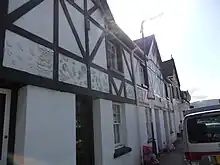Charles Henry Crompton-Roberts
Charles Henry Crompton-Roberts (né Roberts; 7 March 1832 – 15 November 1891) was a British landowner and politician. He was briefly a Member of Parliament before his election was annulled in 1880, and was a substantial contributor to the amenities and community of Monmouth in Wales.
Charles Henry Crompton-Roberts | |
|---|---|
| Born | Charles Henry Roberts 7 March 1832 |
| Died | 15 November 1891 (aged 59) Belgrave Square, London |
| Nationality | British |
| Occupations |
|
| Known for |
|
Biography
Charles Henry Roberts was born in Pedmore, Worcestershire,[1][2] the son of Charles Roberts and Marianne (née Noble). His father was a descendant of William Roberts, who had been responsible for rebuilding Drybridge House, Monmouth, as the family's home in the late 17th century. In 1861, Charles Henry Roberts married Mary Crompton, an only child and heiress from Breightmet, near Bolton, Lancashire. He sought and received royal assent to add the name of Crompton to his own surname, so enabling him to inherit her family's estates.[3][4]

Crompton-Roberts acquired Drybridge House in 1867, and carried out its restoration and enlargement. While retaining the period features of the existing building, he added a new south wing and commissioned a number of stained glass windows.[5] He also designed a fine parkland garden around the house, incorporating a cricket pitch upon which W. G. Grace later played. Another family friend was Edward Elgar, who married one of Charles' Worcestershire cousins, Alice Roberts.[6] Crompton-Roberts purchased land at Trellech Grange from the Duke of Beaufort in 1875, and was appointed High Sheriff of Monmouthshire in 1877.[4]
In 1880, he stood as the Conservative candidate in a by-election for the parliamentary constituency of Sandwich in Kent, where the previous Liberal Member of Parliament (MP), Edward Knatchbull-Hugessen, had been raised to the peerage. Crompton-Roberts stood against the Liberal candidate, Sir Julian Goldsmid, and won the election by 1145 votes to 705. Although Crompton-Roberts took his seat as an MP, the result was annulled after a few months, following a report by a Royal Commission set up to investigate the election. This revealed extravagantly corrupt practices by both sides in offering bribes for votes, which had been a feature of elections in Sandwich for many years. Crompton-Roberts forfeited his seat in Parliament in 1881, the seat was left vacant, and the constituency was abolished before the subsequent General Election.[7][8]
He continued to contribute financially to the amenities of Monmouth, and was responsible for the reconstruction in 1888 of the mediaeval Cross opposite the Church of St Thomas in Overmonnow, near Drybridge House. He also decorated houses in Drybridge Street, and his own summer houses, with large wooden blocks used in the hand printing of wallpaper.[9] At the time of his death he held the positions of Governor of Monmouth School and Monmouthshire County Magistrate, and represented the Borough on Monmouthshire County Council. He was also reported to be sole proprietor of the varnish manufacturing firm Noble and Hoare, of Cornwall Road, Lambeth.[10][11]
Death and memorials
He died at his London home at 16 Belgrave Square in 1891.[12] He was reported to have suffered from acute neuralgia for which he had sought several cures including hypnosis, but without success.[10]
His funeral was held on 19 November 1891. Crompton-Roberts had requested to be buried at St Mary's Priory Church in Monmouth, but the churchyard was closed for new burials so he was buried at Rockfield Church and burying ground a few miles away.[11] Blinds were drawn and shutters put in place in Monmouth for the funeral as a mark of respect. The borough maces and mace bearers were present, as was the Mayor of Monmouth. The staff sergeants of the Royal Monmouthshire Royal Engineers Militia formed the guard of honour. It was reported that 40 staff from Noble and Hoare attended the funeral.[10][11]
His estate was worth £274,147 7s 6d, not including an insurance policy he had worth £100,000. He owned Drybridge House at Monmouth, Field House at Clent, and 16 Belgrave Square, London.[13] Memorial stained glass windows were dedicated in his memory at St Mary's in Monmouth, and at Trellech[14]
He had three sons: Henry Roger Crompton-Rogers, DSO, and officer in the Grenadier Guards; Charles Montague Crompton-Rogers, who became High Sheriff of Monmouthshire in 1897; and Leicester Neville Crompton-Roberts, who is buried in Highgate Cemetery (west side); and two daughters, Violet Mary and Mildred Theodora.
References
- Family Search: England Births and Christenings,for Charles Henry Roberts. Accessed 16 February 2012
- Family Search: England and Wales Census, 1881 for Charles H Roberts. Accessed 16 February 2012
- Bernard Burke, A genealogical and heraldic history of the landed gentry of Great Britain & Ireland (Volume 2), p.191. Accessed 9 February 2012
- Charles Henry Crompton-Roberts at FamilySearch Archived 3 March 2016 at the Wayback Machine. Accessed 9 February 2012
- John Newman, The Buildings of Wales: Gwent/Monmouthshire, 2000, ISBN 0-14-071053-1, p.402
- Drybridge House at People's Collection Wales. Accessed 9 February 2012
- William Mills Ivins, Machine politics and money in elections in New York City, Ayer Publishing, 1970, pp. 134–139
- H. J. Hanham, The nineteenth-century constitution 1815–1914: documents and commentary, Cambridge University Press, 1969, pp. 290–291
- Kissack K (2003), Monmouth and its Buildings, Logaston Press, ISBN 1-904396-01-1, pp.77, 155
- Western Mail, Cardiff, 17 November 1891, Issue 7019
- Funeral of CH Crompton-Roberts, Western Mail, Cardiff, Wales, Friday, 20 November 1891; Issue 7022
- London Gazette, 22 July 1892
- Will Probate and duty - The Times, Friday, 25 December 1891; pg. 5; Issue 33517; col F
- Kelly's Directory 1901, Trellech